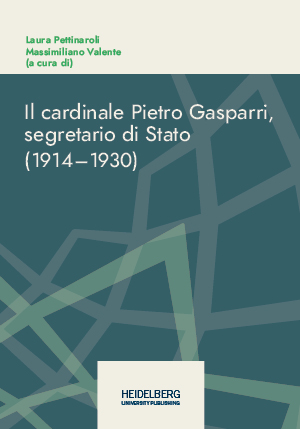Zitationsvorschlag
Lizenz (Kapitel)

Dieses Werk steht unter der Lizenz Creative Commons Namensnennung - Weitergabe unter gleichen Bedingungen 4.0 International.
Identifier (Buch)
Veröffentlicht
Gasparri e i rapporti ufficiosi con il governo italiano durante la Grande Guerra
Abstract: This paper intends to propose a synthetic analysis of the diplomatic activity of Cardinal Pietro Gasparri during his long stay at the top of the Vatican Secretariat of State. As one of the most binding negotiations that the high prelate had to conduct, it can certainly be counted the one relative to the complex relationship with Italy during the so-called "preconciliation" phase. Therefore that brief reconstruction marks out the main aspects concerning the time frame from the First World War to the immediate post-war period. Indeed, the steps taken between the Vatican and Rome in the years of the conflict are to be considered as fundamental for the recovery of the talks with the last liberal Italian governments and later with Benito Mussolini as Prime Minister. In this context, Pietro Gasparri’s role was decisive thanks to his prolonged presence in the negotiations during the two pontificates of Benedict XV and Pius XI, due to his juridical competences that are brought to light by the main historiography on the subject. For the reconstruction from the historical point of view of this unofficial relationship and the role played by the Secretary of State it is essential to consult the documentation preserved in the Vatican Archives both for political-diplomatic questions, and for the work of mediation between the Central powers and Italy over the issue of prisoners of war. The intense diplomatic activity was strategical for the prestige of the Holy See from the period of the Great War onwards and it allowed Vatican to strengthen its international position to establish mutual relations with those countries where there were no official agreements as in the case of Italy.






